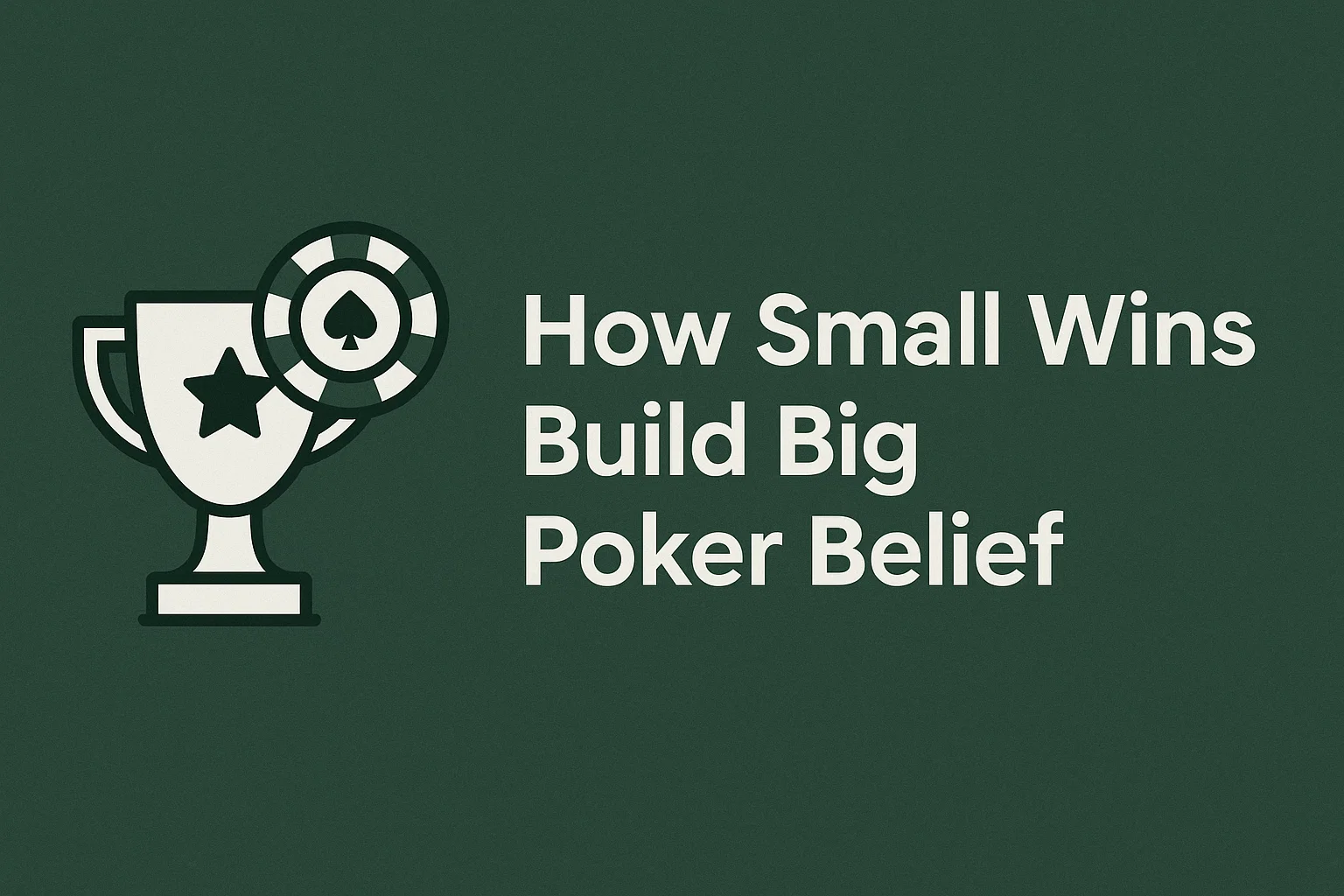
What You’ll Learn
- Understanding the Confidence Loop: Learn what the confidence loop is and how it impacts your mindset and performance in poker.
- The Power of Small Wins: Discover how celebrating small victories can enhance your self-belief and motivation during gameplay.
- Strategies for Achieving Small Wins: Explore effective techniques for setting achievable goals that lead to incremental successes in your poker journey.
- Overcoming Setbacks: Learn to harness small wins as a tool for developing resilience and staying optimistic, even in the face of failure or grueling sessions.
- Building Long-Term Success: Learn how adopting a small-wins mindset can translate into long-term betterment and confidence in your overall poker skill.
Confidence at the poker table is less about entering a room with your head held high. It's more about sitting down, taking the ride of the unknown hand after hand, and trusting your process, especially when chips are hitting the table and pressure is on.
If you've ever watched a confident player play, you know how it looks. They don't freak out when things don't turn out as expected. They make an instinctive choice and don't waste energy questioning themselves. What isn't immediately clear is how they did it.
Most players assume that confidence comes after big wins. Win a tournament, knock out some sessions, and then the confidence kicks in, yeah? That's backwards.
Confidence starts from within. And becoming it is piling up small wins, decision by decision. Folding a second-best hand instead of calling off, for example, making a sound preflop adjustment, or just being present for your weekly study session - these "minor" triumphs are worth more than you think.
In this entry, I will show you how to build the Confidence Loop, a robust feedback loop where small behaviors generate belief, belief generates improved decisions, and those decisions generate ever more confidence playing at official website.
Because once you understand how this loop works, you can stop hoping for confidence to magically happen and start building it on purpose.
What Confidence Looks Like at the Poker Table
Before we get to how to build it, let's get a handle on what real poker confidence is.
Confident players are not necessarily the loudest people at the poker table. They're not necessarily the ones triple barreling or stacking chips nonstop. Real confidence is different. It's even-keel, cool, and even when all hell breaks loose, still remaining the same.
These are some of the telltale signs you're playing with real confidence:
- You play aggressively, not doubting every move.
- You stick with your plan, even if it doesn't work immediately.
- You recover after taking a bad beat or making a mistake.
Of course, confidence is not a born ability. It's not something you have or not. It's a skill, like reading ranges, c-betting, or recognizing bet sizing tells. And like any skill, we can learn it.
Your goal isn’t to fake confidence or “act tough” at the table. Instead, the goal is to create a foundation where your self-trust grows naturally from your choices, both in-game and away from the felt.
And that’s where the Confidence Loop comes in.
The Psychology Behind the Confidence Loop
Here is a repeatable process to build belief in your game, even if you’re not crushing right now:
You play. You show up, read a location, play a session, or make a decision that is consistent with your current level of good poker.
You win small. A small win is any decision you are content with. Maybe you finally 3-bet out of the big blind with A5s, or you folded top pair when every part of your body told you they had it.
- You create belief. That win—no matter how small—confirms your mind, "See? I can do this." And evidence grows from belief, not praise.
- Your drive increases. Once you feel that positive push, you'll likely do something again tomorrow too. It builds momentum.
- You repeat it. And before long, those small wins pile up, creating a steady, self-perpetuating cycle of confidence and capability.
The confidence cycle sounds cliché, yet it's rooted in good science. Psycho-logically, we know that behaviors build beliefs, not the other way around, that beliefs create behaviors. So if you want to feel confident, you need to start by doing things that build that belief.
Another thing is important: you don't need confidence to actually take effective action. You simply need to do what you intend based on your goals. When you take action from being the person you aspire to be as a player, not considering fear or self-doubt, you develop your mental game inside out.
Final Thoughts: Confidence is Earned, Not Given
If there's one takeaway I want you to hold on to, it's this:
Confidence is not something you wait for—it's something you create through action.
You don't need to feel like you're invincible in order to play well. You don't need to wait until you're playing great to believe you can. What you do need is a system for building belief, one decision at a time.
That's what the Confidence Loop gives you.
- Each and every little win you capture…
- Each and every process goal you achieve…
- Each and every second that you play based on the player you want to become.
It all accumulates.
So here is your task: choose one area of your game where you can start building tiny wins for the week. Maybe it is discipline, maybe it is decision-making, maybe it is regulation of your emotions. Start there. Build your loop. Keep repeating it.